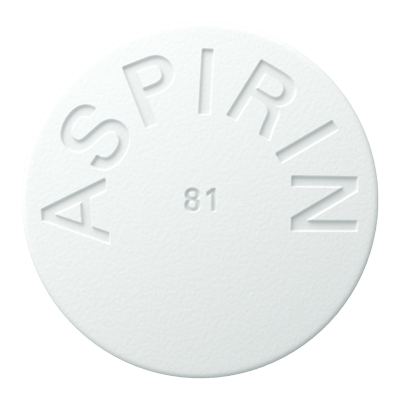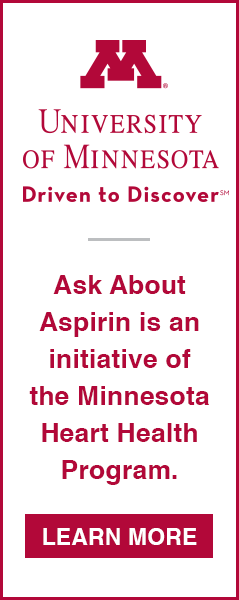Welcome to AskAboutAspirin.org

ABOUT THE PROGRAM
The Minnesota Heart Health Program
The Minnesota Heart Health Program (MHHP) has a 35-year tradition of partnerships and initiatives to improve cardiovascular health across the state and the nation. The program uses the knowledge gained from these initiatives to influence public policy and create practical cardiovascular disease prevention activities for the benefit of individuals, families, and communities.
“Ask About Aspirin”
The “Ask About Aspirin” initiative promotes the appropriate use of low dose aspirin to lower the number of first heart attacks and strokes in our state. Introduced by the MHHP in 2012 to support the State of Minnesota Heart Disease and Stroke Prevention Plan, “Ask About Aspirin” was designed by the Lillehei Heart Institute at the University of Minnesota Medical School in partnership with the School of Public Health and the Department of Family Medicine and Community Health. The “Ask About Aspirin” Initiative is also an official partner of the U.S. Department of Health and Human Services Million Hearts® initiative.
Why Aspirin?
While low dose aspirin can lower the risk of a first heart attack or stroke in appropriate patients, only 30-40% of at-risk Minnesota adults use daily low dose aspirin to lower their risk. Taking aspirin can be a great choice, but talk with your health professional and make this decision together.
The United States Preventive Services Task Force (USPSTF), the Centers for Disease Control (CDC), the American Heart Association, and the Minnesota Department of Health, recommend use of low dose aspirin for prevention of a first heart attack or stroke and colorectal cancer.
How the “Ask About Aspirin” Initiative Works
The “Ask About Aspirin” initiative is designed to quickly and safely lower cardiovascular disease risk using two key components: first, a statewide public awareness campaign promotes the importance of appropriate primary prevention (prevention of a first heart attack or stroke) aspirin use among adults ages 50-69; second, a health professional initiative provides the education and tools necessary to facilitate the appropriate recommendation of primary prevention aspirin use to patients.
How We Will Know if the “Ask About Aspirin” Initiative is a Success
Success will be measured through public aspirin use surveys before, during, and after the initiative. As well, health systems and primary care clinics may track the impact their primary prevention quality improvements activities have on key clinical outcomes.
Our Advisory Board
American Heart Association
Minnesota Department of Health
Minnesota Medical Association
American College of Cardiology, Minnesota Chapter
Minnesota Academy of Family Physicians
Institute for Clinical Systems Improvement
Minnesota Community Measurement
HealthPartners Institute
Northpoint Health and Wellness Center




